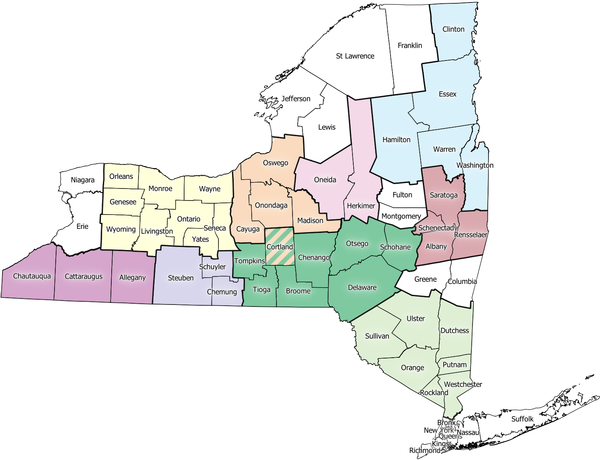What is a Regional Council?
 Capital District Regional Planning Commission: Albany, Rensselaer, Saratoga, Schenectady
Capital District Regional Planning Commission: Albany, Rensselaer, Saratoga, Schenectady Central New York Regional Planning and Development Board: Cayuga, Cortland, Madison, Onondaga, Oswego
Central New York Regional Planning and Development Board: Cayuga, Cortland, Madison, Onondaga, Oswego Genesee/Finger Lakes Regional Planning Council: Genesee, Livingston, Monroe, Orleans, Ontario, Seneca, Wayne, Wyoming, Yates
Genesee/Finger Lakes Regional Planning Council: Genesee, Livingston, Monroe, Orleans, Ontario, Seneca, Wayne, Wyoming, Yates Herkimer-Oneida Counties Comprehensive Planning Program: Herkimer, Oneida
Herkimer-Oneida Counties Comprehensive Planning Program: Herkimer, Oneida Hudson Valley Regional Council: Dutchess, Orange, Putnam, Rockland, Sullivan, Ulster, Westchester
Hudson Valley Regional Council: Dutchess, Orange, Putnam, Rockland, Sullivan, Ulster, Westchester Lake Champlain-Lake George Regional Planning and Development Board: Clinton, Essex, Hamilton, Warren, Washington
Lake Champlain-Lake George Regional Planning and Development Board: Clinton, Essex, Hamilton, Warren, Washington Southern Tier Central Regional Planning and Development Board: Chemung, Schuyler, Steuben
Southern Tier Central Regional Planning and Development Board: Chemung, Schuyler, Steuben Southern Tier Eight Regional Planning Development Board: Broome, Chenango, Cortland, Delaware, Otsego, Schoharie, Tioga, Tompkins
Southern Tier Eight Regional Planning Development Board: Broome, Chenango, Cortland, Delaware, Otsego, Schoharie, Tioga, Tompkins Southern Tier West Regional Planning and Development Board: Allegany, Cattaraugus, Chautauqua
Southern Tier West Regional Planning and Development Board: Allegany, Cattaraugus, Chautauqua Cortland County is a member county of both the Central New York Regional Planning and Development Board and the Southern Tier East Regional Planning Development Board
Cortland County is a member county of both the Central New York Regional Planning and Development Board and the Southern Tier East Regional Planning Development Board
A Regional Council is a public organization created to foster coordination among neighboring counties and to provide a regional approach to issues that cross municipal boundaries. The local governments representing these counties have joined together voluntarily to address common economic and social concerns through the efforts of Regional Councils. Regional Councils are multi-purpose organizations with legal status. Most are voluntary associations and do not have the power to regulate or tax. Primarily funded by county governments and with state and federal funds, Regional Councils are responsible to the representatives of the counties in their regions. The governing bodies of Regional Councils are primarily composed of local government officials and/or appointed representatives of local and county government.
Nationwide, there are more than 670 Regional Councils, representing almost all 50 states. These councils are a vehicle for local governments to share their resources, and to make the most of funding, planning and human resources. Through communication, planning, policy making, coordination, advocacy, and technical assistance, Regional Councils serve local governments and citizens by dealing with issues that cross city, town, county, and in some instances, state boundaries. This regional view encourages an impartial, bipartisan conduit for the exchange of information, and fosters objective recommendations for the resolution of problems.

